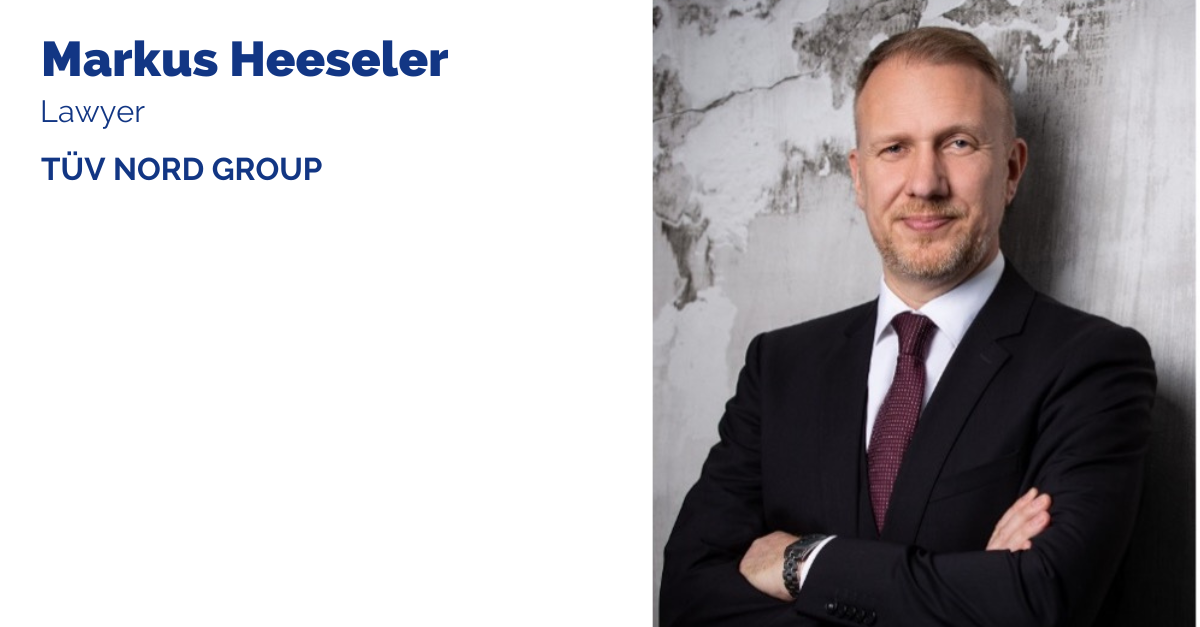TÜV NORD: 'Anyone who can afford lawyers should also afford an AI'
Making the world a safer place – that is TÜV NORD's mission. Independent, trustworthy and professional, the experts test, assess and certify across numerous sectors such as mobility, property, energy and industry. The coveted TÜV quality seals are recognised worldwide and represent standards that people and companies can rely on.
The TÜV brand has stood for neutrality, safety and reliability worldwide for over 150 years. These guiding values also played a key role in the decision in favour of Legal AI from Legartis. In this fascinating interview, Markus Heeseler, lawyer, business economist (VWA) and member of the legal department at TÜV NORD, tells us why TÜV NORD reviews NDA contracts with Legartis and how this is affecting the image of the legal department.
Mr. Heeseler, what was the deciding factor for TÜV NORD to opt for AI?
AI is a megatrend that is also gaining traction in the field of legal tech. TÜV NORD has been using this technology in a variety of ways for some time now. For example, we have founded a joint venture with other TÜV companies to develop AI-safety testing. We're looking at the question: what standards should apply to the testing of artificial intelligence?
And the application of AI in our own organisation hasn’t been neglected either. For example, there will soon be an AI-supported internal chat tool. Consequently, we have also been looking for AI support for our legal department, starting with the review of non-disclosure agreements.
TÜV NORD clearly recognised the "AI trend" at an early stage. What advantages does your company expect from AI, particularly in the legal field?
Nobody knows better than we do at TÜV NORD that where there are people, mistakes are made. It's human to forget or overlook something. This is where we see the great potential of AI: it reduces errors. This helps us particularly with standard texts that have to be routinely checked. Other important advantages for us are:
- Time savings: time is scarce for in-house lawyers. With the help of AI, we can make faster progress in the legal field and conserve this important resource. For example, AI can sift through large volumes of contract documents much faster than human employees.
- Relief for fully qualified lawyers: we can outsource repetitive activities to other departments, for example to contract lawyers in group companies. This frees up time for the legal department.
- Cost savings: by automating contract review and optimising business processes, we can reduce the cost of manual work.
- Increased productivity: AI can be easily scaled to process a large number of contracts in a short amount of time. When resources are used skilfully, added value is created in the company.
Why did TÜV NORD decide specifically in favour of Legartis?
We looked at various tools and evaluated them primarily according to their user-friendliness. We wanted to minimise the effort involved in its application and not have a system that has to be opened in an additional window on the desktop. Legartis is integrated as an add-in into Word, which is what convinced us. We were able to use the tool easily after just one training session and could carry out its configuration, such as creating a playbook, alongside our day-to-day business without any IT knowledge.
We were looking for a tool that could be used immediately. Legartis doesn't require a long introductory phase and works via Word add-in. That was perfect for us.
What type of contract do you use Legartis for and why?
We primarily use Legartis for non-disclosure agreements (NDAs) because these are standard texts with a clearly defined scope and low complexity. This is a straightforward area to start with. If AI proves itself here, we may extend its use to other standard texts. Many contracts are standardised; they always involve the same sector with a similar service scope. So it makes sense to work with AI.
How did the onboarding with Legartis Legal AI go? As the project manager, do you have any tips for companies in this situation?
The onboarding went very well. We felt we received comprehensive support, our questions and suggestions were quickly taken into account and everything ran smoothly. However, we realised that the introduction of a new tool naturally requires additional capacity. Making this available alongside our day-to-day business was a challenge.
Legartis support is efficient and straightforward. If we have a question, we can simply make a quick call and get an answer immediately.
Even if Legartis is a small tool that can be introduced without much effort, it's still a project. So we first needed a project structure. Who will manage the project, how will we coordinate, who are the stakeholders, whose opinion will we seek? That would be my number one tip: create a project structure with time to coordinate the content.
The basis of the contract review with Legartis is the playbook, which sets out the rules for the review. This led to initial internal discussions: what specifications do we want to give the AI? In terms of content, everything is then put to the test again. So dividing everything into working groups has proven to be effective. Another tip: for communication and coordination, I recommend creating a digital project group using an application such as MS Teams.
How has Legartis been received by users so far? What feedback has there been?
Legartis is excellent self-promotion for the modern legal department: lawyers, who are otherwise known for being traditional, are right at the forefront! Our colleagues were amazed.
We’re still in the testing phase, but have already received positive feedback. The 16 currently active users agree that Legartis makes their work easier. Of course, many things still need to be finalised. For example, we’re not yet sure to what extent we want to monitor the results of the AI. If a paralegal checks a contract with the AI – is that enough for us? Or should a lawyer be looking over it? We'll find out in the future. But overall, there is already a lot of trust in the AI's services.
We didn't have to deal with any resistance within the company either. We've attracted a lot of positive attention with Legartis, right up to the Management Board. We were met with curiosity and many were also surprised that the legal department is so modern and uses an AI-supported tool.
What advantages or benefits are you already seeing now, after 3 months of use?
The first benefit was the renewed and more intensive engagement with standard texts and the internal specifications for the playbook, which has already provided initial impetus for standardisation. So the set-up is a benefit in itself, but the first steps with an AI are also exciting.
We've reviewed just under 100 NDAs so far, so it's still too early to make any firm statements about its benefits. However, I’m happy to share my personal impressions: I filled in for a colleague on holiday and therefore had twice as many contracts land on my desk – the perfect opportunity to make intensive use of Legartis! And I have to say, it really works very well and has saved me a lot of time.
What benefits do you see for your company in the medium to long term with the use of AI in the legal department?
We're looking forward to the prompt-based automation that is already available at Legartis and want to use it in the medium term. Then we won't even have to make a click – we can leave routine checks entirely to Legartis. The tool will check and approve our checkpoints completely automatically.
There will certainly be other areas of application in the future, for example in the review of general terms and conditions. But AI will also be usable in the area of complex and extensive document reviews (legal analytics), e.g. when processing data rooms in M&A projects or property projects – in fact, wherever extensive documents need to be reviewed according to predefined criteria. The AI can search through the dataspace much faster, allowing us lawyers to focus on specific problem areas.
Another important field of business is international procurement procedures. I can very well imagine AI providing support here. For example, if we receive 200 pages of tender documents for review from India and have to meet a tight deadline, the AI could steer the review process and relieve time pressure.
Which companies would you recommend Legartis to?
I think that Legartis AI is an asset for any type of legal department. Legartis always makes sense if you're employing at least one lawyer; the tool alone will certainly not do the trick.
The programme offers potential for smaller legal departments in particular, because it compensates for resource bottlenecks. The benefits are simply enormous.
This interview was conducted verbally.
Recommended Articles
Swiss Prime Site: AI to Analyze Over 1’000 Contractual Relationships
The Jelmoli department store on Zurich's Bahnhofstrasse is being closed. For the operating real estate company, Swiss Prime Site (SPS), the closure represents an enormous..



